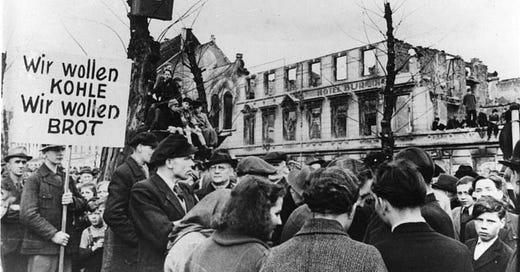When the White Death hit Germany
The coldest winter of the 20th century arrived in 1946 and killed hundreds of thousands of Germans.
Dear Reader,
Seventy-five years ago this month, a horrific winter descended on northern Europe. It was particularly devastating for war-ravaged Germany, where it became known as der Weiße Tod – the white death.
A fascinating new podcast by Deutschlandfunk recounts how, in what would become the coldest winter of the 20th century, temperatures in northern Germany had already dropped to freezing by October.
By November, Hamburg no longer had enough coal to provide heating for its malnourished population, many of whom were living in the ruins of bombed-out buildings.
Hospitals were so short of basic supplies, and the population so weakened by hunger, that even normally mild illnesses proved fatal.
Impoverished and starving city dwellers ventured into the countryside to steal potatoes from farmers. In January, with temperatures falling as low as minus 25 degrees Celsius, children walked to school barefoot.
Millions of refugees from the east competed with locals for scarce resources.
Another consequence of the war that worsened the crisis was the destruction of the rail network – a problem made worse by the freezing conditions. With transport infrastructure paralysed, the limited food supplies available could not be distributed across the country.
The threat of starvation was so severe that Cologne’s archbishop, Joseph Frings, gave his blessing for people to obtain food by any means necessary.
In his New Year’s sermon, he declared:
“We live in times when the needy individual is allowed to take what he needs to preserve his life and health, even if he cannot obtain it through his labour or by petition.”
This blessing entered everyday language, with the word fringsen coming to mean the act of stealing food out of necessity.
Berlin’s mayor, Otto Ostrowski, likened the suffering to a Greek tragedy:
“A mass death has been unleashed and every day the number of casualties rises. And just like in the play Oedipus by Sophocles, the people are groaning under the suffering and are calling for help.”
Historians estimate that several hundred thousand Germans died as a result of the cold that winter.
After visiting Germany in February 1947, former US President Herbert Hoover reported back to Washington that he had witnessed a level of suffering unknown in Europe for over a century.
Hoover’s intervention, along with pressure from German émigrés in the United States, eventually led the US government to allow charities to send care packages to Germany. However, this aid arrived too late to help during the worst of the crisis: the first package didn’t reach Germany until May 1947.
As the Deutschlandfunk episode points out, this wasn’t the first time Germany had endured such brutal cold. In 1929, temperatures dropped so low in the north that the Baltic Sea froze along the German coast.
The winter of 1946/47 was as much a man-made disaster as it was a natural one.
By the time of the First World War, Germany was technologically advanced enough to have lifted itself out of the age-old human dependency on the weather Gods for their survival. It could store energy, food and clothing in sufficient quantities to overcome both harsh winters and years of drought.
Three decades - and countless catastrophic policy errors - later, it had impoverished itself to such an extent that it knew how to deal with an unusually cold winter, but simply didn’t have the means to survive.
There’s likely a lesson here for how we approach climate change in the 21st century. Slowing global warming is clearly an important goal. But we shouldn’t lose sight of the fact that humans can only rise above the vagaries of the weather for as long as our societies remain prosperous enough to do so.






How dare you!!